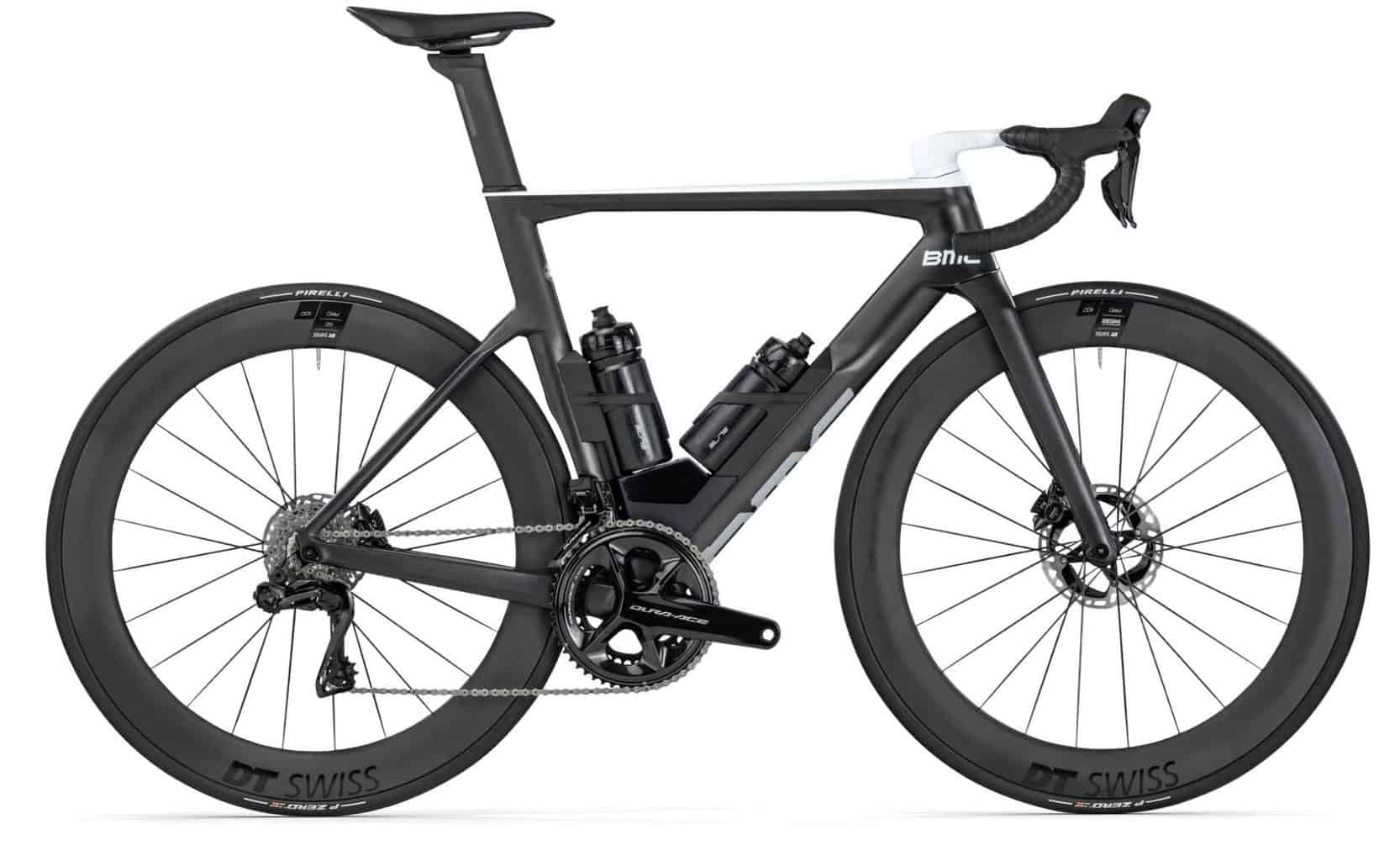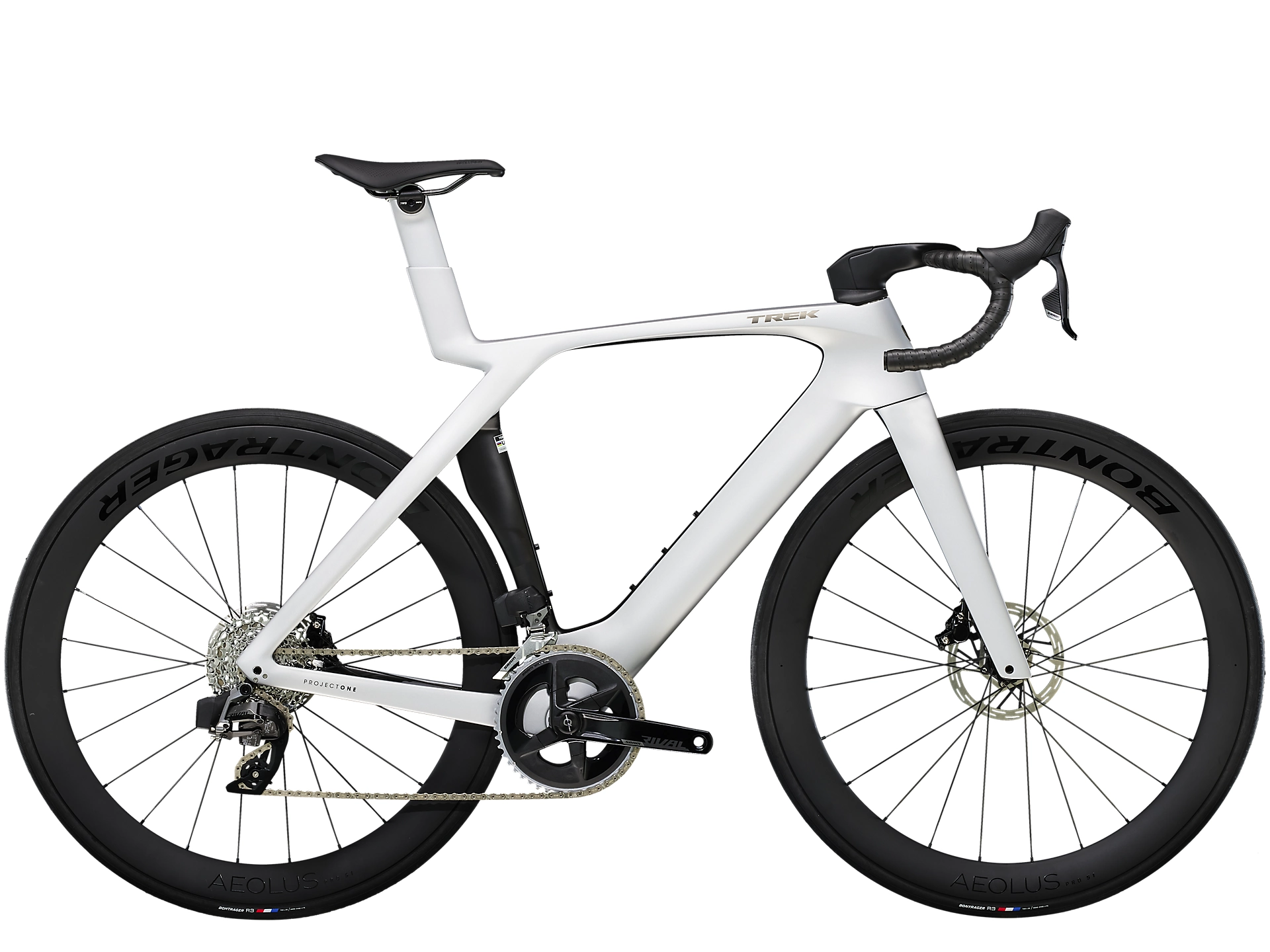In this comparison, I’ll dissect two popular bike models; the BMC Timemachine Road vs Trek Madone.
I’ll compare their lineups, bike specifications, and suggested retail prices in USD, then discuss the carbon fiber technology (BMC ACE+ and Trek OCLV) and frameset technologies.
The goal is to give you a better understanding of BMC Timemachine Road and Trek Madone to help in your decision-making.
| BMC Timemachine Road | Trek Madone | |
|---|---|---|
| Type of bike | Aero | Aero |
| Frame material | Premium 01 carbon | OCLV 800 carbon OCLV 500 carbon |
| Frame sizes | 47, 51, 54, 56, 58, 61 | 47, 50, 52, 54, 56, 58, 60, 62 |
| Groupset | Shimano, SRAM (12-speed) | Shimano, SRAM (12-speed) |
| Brakes | Hydraulic disc | Hydraulic disc |
| Cabling | Internal | Internal |
| Price (USD) | $7,199 to $12,799 | $5,199 to $13,199 |
BMC Timemachine Road

The BMC Timemachine Road 01 is BMC’s fastest bike to date.
Designed for all-out speed, the tubes are aerodynamically shaped, and cables are fully hidden and integrated, achieving a clean front end. All models are specced with deeper 50mm wheels.
The BMC Timemachine Road lineup has three models priced from $7,199 to $12,699. The option for frameset only is also available.
| Model | Frame material | Groupset | Wheelset | Retail price (USD) |
|---|---|---|---|---|
| BMC Timemachine Road 01 One | Premium 01 carbon | Shimano Dura-Ace Di2 (R9200) | DT Swiss ARC 1100 | $12,799 |
| BMC Timemachine Road 01 Two | Premium 01 carbon | Shimano Ultegra Di2 (R8100) | CRD-501 carbon | $7,999 |
| BMC Timemachine Road 01 Three | Premium 01 carbon | SRAM Rival eTap AXS | CRD-501 carbon | $7,199 |
BMC Timemachine Road vs others
Trek Madone

Dubbed the ultimate superbike, the Trek Madone is all about maximizing aerodynamics and speed.
Trek refreshed the Madone in June 2022, just before the Tour de France started. The new Trek Madone features a radical-looking seat tube with a big hole. The previous IsoSpeed system, which allows the seatpost to flex for extra comfort, is replaced by the IsoFlow Technology. According to Trek, the IsoFlow technology adds an aerodynamic advantage, reduces weight, and smooths the road ahead.
The range-topping Madone SLR is built on the Trek’s lightest OCLV 800 carbon, with a one-piece carbon handlebar. The Madone SL models are still based on the previous Madone frame design and use the OCLV 500 carbon.
The Madone SLR frameset is also available separately.
| Model | Frame material | Groupset | Wheelset | Retail price (USD) |
|---|---|---|---|---|
| Trek Madone SLR 9 AXS | OCLV 800 carbon | SRAM Red eTap AXS | Bontrager Aeolus RSL 51 | $13,199 |
| Trek Madone SLR 9 | OCLV 800 carbon | Shimano Dura-Ace Di2 (R9200) | Bontrager Aeolus RSL 51 | $12,749 |
| Trek Madone SLR 7 AXS | OCLV 800 carbon | SRAM Force eTap AXS | Bontrager Aeolus Pro 51 | $9,699 |
| Trek Madone SLR 7 | OCLV 800 carbon | Shimano Ultegra Di2 (R8100) | Bontrager Aeolus Pro 51 | $9,049 |
| Trek Madone SLR 6 AXS | OCLV 800 carbon | SRAM Rival eTap AXS | Bontrager Aeolus Pro 51 | $8,399 |
| Trek Madone SLR 6 | OCLV 800 carbon | Shimano 105 Di2 (R7100) | Bontrager Aeolus Pro 51 | $7,999 |
| Trek Madone SL 7 AXS | OCLV 500 carbon | SRAM Force eTap AXS | Bontrager Aeolus Pro 51 | $7,499 |
| Trek Madone SL 7 | OCLV 500 carbon | Shimano Ultegra Di2 (R8100) | Bontrager Aeolus Pro 51 | $6,999 |
| Trek Madone SL 6 | OCLV 500 carbon | Shimano 105 Di2 (R7100) | Bontrager Aeolus Elite 50 | $5,199 |
BMC vs Trek carbon fiber
BMC ACE+
The BMC ACE+ (Accelerated Composites Evolution Technology +) is the latest carbon fiber layup technology used on all BMC road bikes.
ACE+ operates by determining the cross-sections of the frame, the arrangement of the carbon layers, and the geometric structure based on targeted performance values. Subsequently, it generates thousands of virtual models to pinpoint the ideal equilibrium of performance, focusing on three fundamental aspects; Stiffness, Weight, and Compliance.
BMC has two different carbon grades, 01 Premium Carbon and Premium Carbon, in their road bike frames. The choice between the two carbon grades depends on the rider’s preferences, budget, and desired level of performance.
- 01 Premium Carbon is a high-grade carbon fiber material with superior performance, stiffness, and weight savings. It provides enhanced ride quality with improved power transfer and responsiveness. Premium 01 carbon is used on all BMC models with 01, such as Teammachine SLR01 and Roadmachine 01.
- Premium Carbon is a mid-range carbon fiber material that balances performance, weight, and affordability. It is used on all BMC models without the 01.
Trek OCLV carbon
The OCLV (Optimum Compaction, Low Void) carbon is a proprietary carbon fiber manufacturing technology developed by Trek.
- Optimum Compaction refers to the heat and pressure applied during the curing process to squeeze out excess resin and ensure that the carbon layers are compacted to the optimal density.
- Low Void refers to the goal of reducing microscopic air pockets or voids that can occur in the carbon fiber and create weaknesses.
One of the key advantages of OCLV carbon is its ability to achieve an optimal balance between stiffness, strength, and weight. Trek engineers carefully tune the carbon layup and utilize varying modulus carbon fibers to create stiff frames in certain areas to maximize power transfer while maintaining compliance in other areas to enhance comfort and ride quality.
The OCLV carbon is available in 800 and 500 series.
- OCLV 800 is the highest-grade carbon fiber used by Trek. The carbon modulus is higher in OCLV 800, making it stiffer and lighter. The manufacturing process is more refined, using more advanced carbon and resins, leading to a bike frame that provides top performance levels for stiffness, weight, and strength. OCLV 800 is used in all models with SLR.
- OCLV 500 is a lower-grade carbon but still offers a high level of performance. It has a slightly lower carbon modulus, meaning it’s a bit less stiff and heavier than OCLV 800. OCLV 800 is used in all models with SL.
It’s worth noting that the different OCLV grades don’t only refer to the material itself, but also to the manufacturing techniques used to form the carbon fiber into bike frames. Higher-grade carbon requires more precise manufacturing techniques to take full advantage of its superior material properties.
Frameset technologies and innovations
BMC Timemachine Road and Trek Madone framesets incorporate advanced technologies to enhance their bikes’ performance and ride characteristics.
Here’s an overview of the technologies used in each bike model.
BMC Timemachine Road 01
| Name | Description |
|---|---|
| Accelerated Composites Evolution Plus (ACE+) | ACE+ utilizes advanced computer algorithms and simulation techniques to optimize the layup and design of carbon fiber frames and components. With BMC ACE+, engineers can explore various design possibilities and fine-tune the carbon layup to achieve specific performance objectives. This technology allows precise control over stiffness, compliance, weight, and aerodynamics. ACE+ enables BMC to create frames that offer optimal balance and performance characteristics by analyzing numerous virtual prototypes and conducting virtual testing. |
| Aerocore Design System | An advanced aerodynamic design approach used by BMC to optimize the aerodynamic performance of their road bikes. It is a holistic system that integrates multiple bike elements, including frame shapes, tube profiles, component integration, and overall bike geometry, to minimize aerodynamic drag and maximize efficiency. |
| Integrated Cockpit System (ICS) | Seamlessly integrates the handlebar, stem, and fork to improve aerodynamics, enhance stiffness, and provide a clean, integrated look. The elimination of external cables reduces drag and improves handling responsiveness. |
| Tuned Compliance Concept (TCC) | TCC optimizes vertical compliance by strategically tuning the carbon layup and tube shapes. This technology improves the frame’s ability to absorb road vibrations and bumps, resulting in a smoother and more comfortable ride without sacrificing performance or power transfer. |
Trek Madone
| Name | Description |
|---|---|
| OCLV Carbon | Optimum Compaction, Low Void (OCLV). A carbon fiber technology used in Trek frames. Employs advanced layup techniques and precise carbon compaction to create lightweight, strong frames with a balanced blend of stiffness and compliance. Available in two grades; OCLV 800 and 500. A higher number indicates a higher grade carbon. |
| H1.5 geometry | Trek’s geometry design that strikes a balance between aggressive racing positioning (H1) and rider comfort (H2). H1.5 geometry provides a slightly more relaxed riding position than the racier H1 geometry, making it suitable for a wider range of riders. |
| IsoFlow Technology | A design element in Trek’s new Madone road bike that replaces the previous IsoSpeed technology. The aim is to improve the overall aerodynamic performance, reduce weight, and provide ride comfort by effectively managing airflow and reducing drag in the seat tube area. |
| IsoSpeed Technology | An innovative solution for improving rider comfort on rough surfaces. The IsoSpeed decoupler allows the seat tube to flex independently from the rest of the frame, increasing vertical compliance and smoothing road vibrations. |
| Kammtail Virtual Foil (KVF) | An aerodynamic tube shaping technology used on the Trek Madone. The trailing edge of a traditional airfoil is truncated, creating a virtual tail effect that maintains aerodynamic efficiency while offering a more practical and versatile design. |
| Project One | Trek’s customization program that allows riders to create personalized and unique bikes. With Project One, riders can customize various aspects of their bikes, including frame color, paint scheme, components, drivetrain, wheels, and other details. |
Where to buy
BMC retailers
- BMC retailers. Use this tool to find your nearest BMC retailers.
Trek shops
- Trek online shops. Australia, Austria, Canada, Germany, Netherlands, United Kingdom, United States
- Trek retailers. Use this tool to find your nearest Trek retailers.

Alex Lee is the founder and editor-at-large of Mr. Mamil. Coming from a professional engineering background, he breaks down technical cycling nuances into an easy-to-understand and digestible format here.
He has been riding road bikes actively for the past 12 years and started racing competitively in the senior category during the summer recently.